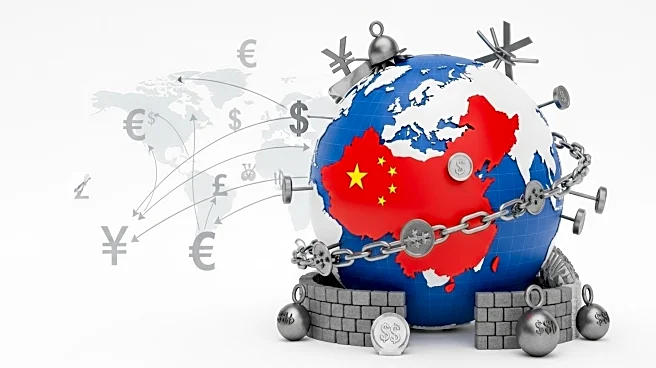What's Happening?
China has announced it will no longer seek the special treatment afforded to developing countries under World Trade Organization (WTO) agreements. This decision, revealed by Commerce Ministry officials, is aimed at strengthening the global trading system, which is currently challenged by tariff wars and protectionist policies. The change, announced by Chinese Premier Li Qiang at a development forum during the U.N. General Assembly, affects ongoing and future negotiations but not existing agreements. The U.S. and European countries have long criticized China for barriers to their exports, arguing that China, as the world's second-largest economy, should relinquish its developing-country status. Despite this change, China maintains it is still part of the developing world.
Why It's Important?
China's decision to forgo its developing-country status in the WTO is significant as it addresses longstanding demands from the U.S. and other nations for a more level playing field in global trade. This move could potentially lead to increased access for foreign goods in China's market, impacting international trade dynamics. The decision also highlights China's evolving role in the global economy, as it increasingly provides loans and technical assistance to other countries. The WTO, which has been criticized for its inefficacy, may see this as a step towards reform, potentially influencing future trade negotiations and agreements.
What's Next?
The implications of China's decision are yet to be fully realized, but it could lead to shifts in trade negotiations and policies. Major stakeholders, including the U.S. and European countries, may respond by pushing for further reforms within the WTO. Additionally, China's move might encourage other developing countries to reconsider their status, potentially altering the landscape of international trade agreements. Observers will be watching closely to see if this leads to greater market access and reduced trade barriers.
Beyond the Headlines
China's decision to renounce its developing-country status may have deeper implications for global economic governance. It could signal a shift in how countries self-identify within international organizations, potentially influencing the balance of power in global trade. This move might also reflect China's strategic positioning as a leader in global economic development, as it continues to invest in infrastructure projects worldwide. The ethical and cultural dimensions of China's evolving role in the global economy could become a focal point for future discussions.











